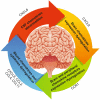Chemokine Dysregulation and Neuroinflammation in Schizophrenia: A Systematic Review
- PMID: 36768537
- PMCID: PMC9917146
- DOI: 10.3390/ijms24032215
Chemokine Dysregulation and Neuroinflammation in Schizophrenia: A Systematic Review
Abstract
Chemokines are known to be immunoregulatory proteins involved not only in lymphocyte chemotaxis to the site of inflammation, but also in neuromodulation, neurogenesis, and neurotransmission. Multiple lines of evidence suggest a peripheral proinflammatory state and neuroinflammation in at least a third of patients with schizophrenia. Therefore, chemokines can be active players in these processes. In this systematic review, we analyzed the available data on chemokine dysregulation in schizophrenia and the association of chemokines with neuroinflammation. It has been shown that there is a genetic association of chemokine and chemokine receptor gene polymorphisms in schizophrenia. Besides, the most reliable data confirmed by the results of meta-analyses showed an increase in CXCL8/IL-8, CCL2/MCP-1, CCL4/MIP-1β, CCL11/eotaxin-1 in the blood of patients with schizophrenia. An increase in CXCL8 has been found in cerebrospinal fluid, but other chemokines have been less well studied. Increased/decreased expression of genes of chemokine and their receptors have been found in different areas of the brain and peripheral immune cells. The peripheral proinflammatory state may influence the expression of chemokines since their expression is regulated by pro- and anti-inflammatory cytokines. Mouse models have shown an association of schizophrenia with dysregulation of the CX3CL1-CX3CR1 and CXCL12-CXCR4 axes. Altogether, dysregulation in chemokine expression may contribute to neuroinflammation in schizophrenia. In conclusion, this evidence indicates the involvement of chemokines in the neurobiological processes associated with schizophrenia.
Keywords: CCL2; CCL4; CXCL8; IL-8; chemokines; cytokines; inflammation; neuroinflammation; receptor; schizophrenia.
Conflict of interest statement
The authors declare no conflict of interest.
Figures


References
Publication types
MeSH terms
Substances
Grants and funding
LinkOut - more resources
Full Text Sources
Medical
Research Materials
Miscellaneous

